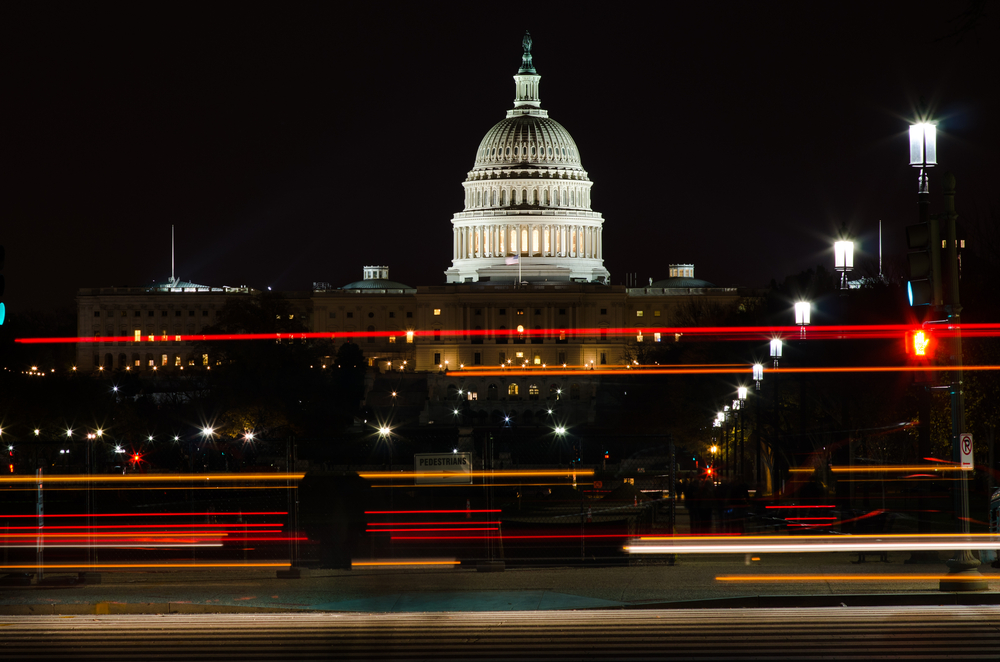United States Policy Makers Need An Education On Blockchain Technology

The U.S. government has a sordid history of funding terrorists. | Source: Shutterstock
Update: The headline and parts of the article have been edited to reflect that the US Congress consists of the Senate and House of Representatives together.
It’s no secret that lobbyists and special interests groups can move mountains in the U.S. government, or any government for that matter.
No interest group seems to be better banked than that of the financial institutions and U.S. Rep. David Schweikert, R.-Arizona has requested that experts and enthusiasts alike contact and educate their elected representatives in the U.S. to get them on the right side of history before well-funded lobbyists on the sides of terrified banks get their hooks in.
A Select Few Washington Insider Blockchain Advocates
Speaking at the D.C. Blockchain Summit which took place at Georgetown University’s McDonough School of Business on March 3rd, Rep. Schweikert spoke to an audience that varied from private blockchain and Bitcoin entrepreneurs to other Federal Government officials as well as with high-level finance executives and pundits.
Rep. Schweikert can be considered one of the more forward thinking individuals in Congress as he is, at least, asked some inquiring questions in the past regarding Bitcoin back in 2014. What seemed to be fear and apprehension on his part just 2 years ago has seemed to turn into somewhat of a passionate stance towards making sure that blockchain technology, the backbone of Bitcoin’s inner workings, is proliferated as far and wide as possible. With so much corruption, waste and still such massive profits in the financial markets, blockchain could be a severe disruption to a very well cloaked industry.
Why Knowledge of Blockchain Technology Must Spread
The United States of America’s Congress can be categorized in a lot of ways in how they relate to a fast changing world. Reactive versus proactive is certainly one way that would describe how these elected officials approach emerging trends and technologies.
With the hype behind blockchain technology spreading like a well-fueled fire, it’s becoming a large question of what sort of road blocks it will encounter in the United States Government once it actually gets their full attention and raises some flags.
Some other Congressmen have come forward for at least pressing the matter of having an open and honest dialog on the matter of cryptocurrencies, Bitcoin, blockchain and potential futures they might have in relation to the Federal Government. However in Rep. Schweikert’s opinion, there are maybe only
However in Rep. Schweikert’s opinion, there are maybe only 6 or so of his peers who actually have a working knowledge of these subject matters and he finds the huge vacuum of knowledge to be alarming, as he foresees big finance vested interests swooping in any day now to sway blockchain legislation into their favor and preserve their massive domestic and global market share.
Legislators Must Lean Towards Transparency
Pundits has labeled blockchain technology in a variety of ways, including as being as revolutionary as the internet. Regardless of how impactful blockchain technology can be in application, the ultimate yardstick that needs to be held up to it is how much better it could make the world. U.S. politicians are notorious for digging their heels in the sand in puzzling circumstances.
They’re rarely leaned towards acceptance of anything decentralized and paint with a large brush a gray area around the legality of largely positive yet entirely disruptive business models like Airbnb, Uber and even the legalized marijuana models within several U.S. states. New markets are always places ripe for corruption just as established industries are, however stifling innovation and defaulting towards inaction isn’t an acceptable response.
Blockchain technology is a method of transparency and accountability in and of itself. There’s no need for trusted administrators or codes of ethics to manage the safe handling and application of it. For all of the arguments that jobs will be lost, or industries might become displaced, the benefit of having the economy be a few steps closer to benefiting everyone, rather than those who are able to manipulate it to their own interests.
U.S. legislators truly owe it to their constituents to learn as much as possible about this technology so that it not only can have a chance to spread to aspects of industry and society that need it, but to also ensure that it’s not stamped out by crushing legislation that leave the U.S. behind in an increasingly competitive world economy that won’t collectively ignore blockchain technology and what it has to offer.
Featured image from Shutterstock.